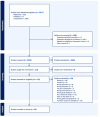Washing Illness Away: A Systematic Review of the Impact of Nasal Irrigation and Spray on COVID-19
- PMID: 39268910
- PMCID: PMC11725691
- DOI: 10.1002/lary.31761
Washing Illness Away: A Systematic Review of the Impact of Nasal Irrigation and Spray on COVID-19
Abstract
Objective: Nasal irrigation is a common treatment for sinonasal disorders; however, it is unknown if it can reduce SARS-CoV-2 nasopharyngeal viral load (NVL). This systematic review investigated the efficacy of nasal irrigation with saline, povidone iodine (PVP-I), and intranasal corticosteroids (INCS) at reducing SARS-CoV-2 NVL and transmissibility.
Data sources: Databases including Embase, MEDLINE, Web of Science, and ClinicalTrials.gov.
Review methods: A systematic review was completed with pre-defined search criteria using keywords related to nasal irrigation and COVID-19 from 1946 through January 2024. This review followed PRISMA reporting guidelines and was registered on PROSPERO. Only in-vivo studies testing nasal irrigation with either saline, PVP-I, or INCS for reducing NVL were included.
Results: Nine out of ten studies on saline-based solutions reported positive effects in reducing NVL, with benefits noted in earlier time to negative nasopharyngeal PCR and a greater decline in NVL during early study time points, compared with controls. Isotonic and hypertonic saline mediums were found to be effective with three studies demonstrating enhanced efficacy with additives. Four out of seven studies on PVP-I showed a positive effect on reducing NVL, but results were heterogenous. Four studies demonstrated reduction of transmission with saline or PVP-I. No studies were found on INCS.
Conclusion: Saline nasal irrigation showed the best efficacy in reducing SARS-CoV-2 NVL. Additives to saline may have a clinical benefit, but further studies are needed to elucidate their isolated impacts on NVL. Data on PVP-I is inconclusive and further studies are warranted to determine the ideal concentration for irrigation. Laryngoscope, 135:517-528, 2025.
Keywords: COVID‐19; INCS; PVP‐I; nasal saline irrigation; viral load.
© 2024 The Author(s). The Laryngoscope published by Wiley Periodicals LLC on behalf of The American Laryngological, Rhinological and Otological Society, Inc.
Figures


References
-
- Coronavirus (COVID‐19) | IPAC Canada . Accessed June 9, 2024. https://ipac-canada.org/coronavirus-resources
Publication types
MeSH terms
Substances
LinkOut - more resources
Full Text Sources
Medical
Miscellaneous

